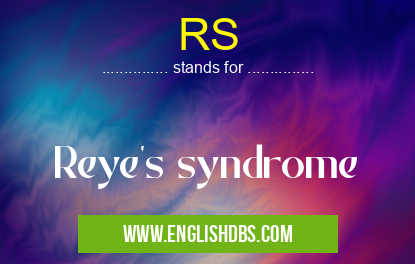What does RS mean in HOSPITALS
RS (Reye's syndrome) is a rare but serious condition that can affect children and teenagers. It is caused by a combination of a viral infection, such as the flu or chickenpox, and the use of aspirin.

RS meaning in Hospitals in Medical
RS mostly used in an acronym Hospitals in Category Medical that means Reye's syndrome
Shorthand: RS,
Full Form: Reye's syndrome
For more information of "Reye's syndrome", see the section below.
Symptoms
Symptoms of RS can include:
- Vomiting
- Confusion
- Seizures
- Coma
- Liver failure
- Brain damage
Causes
The exact cause of RS is not fully understood, but it is thought to be related to a defect in the mitochondria, which are the energy-producing units of cells. This defect can lead to a build-up of toxins in the body, which can damage the liver and brain.
Treatment
There is no specific cure for RS, but treatment can help to manage the symptoms and improve the chances of survival. Treatment may include:
- Intravenous fluids
- Medications to control seizures and vomiting
- Liver transplant
- Brain surgery
Prevention
The best way to prevent RS is to avoid giving aspirin to children and teenagers. Aspirin should not be given to children under the age of 19 who have a viral infection.
Essential Questions and Answers on Reye's syndrome in "MEDICAL»HOSP"
What is Reye's syndrome (RS)?
Reye's syndrome (RS) is a rare but potentially fatal condition that affects the liver and brain. It primarily occurs in children and teenagers who have recently recovered from a viral infection, such as chickenpox or influenza.
What causes Reye's syndrome?
The exact cause of RS is unknown, but it is thought to be related to a mitochondrial dysfunction. Mitochondria are the energy-producing organelles within cells, and their impairment can lead to a buildup of toxins in the liver and brain.
What are the symptoms of Reye's syndrome?
Symptoms of RS typically develop within a few days after recovering from a viral infection. These symptoms include:
- Persistent vomiting
- Lethargy and fatigue
- Confusion and disorientation
- Seizures
- Liver damage
- Coma
How is Reye's syndrome diagnosed?
Diagnosis of RS is based on clinical symptoms, physical examination, and laboratory tests. Blood tests can detect elevated liver enzymes, indicating liver damage, and a liver biopsy may be performed to confirm the diagnosis.
How is Reye's syndrome treated?
There is no specific cure for RS, and treatment focuses on supportive care. This includes:
- Intravenous fluids and electrolytes to correct dehydration
- Medications to prevent seizures and reduce brain swelling
- Liver support, if necessary
- Monitoring of vital signs and neurological status
What are the complications of Reye's syndrome?
RS can lead to severe complications, including:
- Liver failure
- Brain damage
- Seizures
- Coma
- Death
How can Reye's syndrome be prevented?
The best way to prevent RS is to avoid taking aspirin or aspirin-containing products for viral infections in children and teenagers. Other precautions include:
- Getting vaccinated against chickenpox and influenza
- Maintaining good hygiene to prevent viral infections
- Seeking medical attention promptly for symptoms of viral infections
Final Words: RS is a serious condition that can be life-threatening. However, early diagnosis and treatment can improve the chances of survival. If you think your child may have RS, seek medical attention immediately.
RS also stands for: |
|
| All stands for RS |
